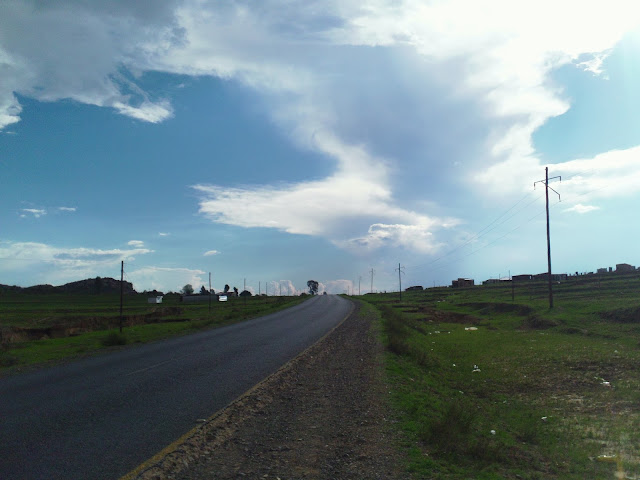So you’re standing or sitting
by the side of the road, or if you’re lucky enough, as I am, to have an actual
bus shelter to sit under, you’re chillin’ there. It’s probably sunny outside,
but maybe it’s rainy or breezy or cold. All around you, it’s serene. Cows,
goats, donkeys and sheep make their perspective animal noises on their way to
the fields as the herd boys grunt and occasionally throw stones at them to keep
them in line, skinny dogs following closely behind. Birds are chirping, and
once in awhile you wonder what particular bird is making that particular sound,
or marvel at a new sound you hadn’t noticed before. People call to others from
far away, and you watch the boys who sometimes use the bus shelter as their
play area sit and play a game with stones. The world is doing what it does and
you’re just happy to be a part of it, a witness to it all.
And then it comes. Sometimes
slowly and steadily, like an old dog waking up from a good dream, and sometimes
rapidly, barreling around the bends in the road, semi-rusted metal clanging and
swishing through the breeze.
Either way, your taxi is here. It’s a small
mini-bus, sometimes brightly painted and sometimes plain white or silver, and it’s here
to take you where you need to go.
Immediately upon ducking down
to enter and, most days, greeting the other passengers, it’s clear that you’ve
entered a world apart from the quiet one you just left. Most often, loud music
assaults your senses as soon as you duck down to enter, serving as your welcome
to this traveling state of affairs. On the good days it’s a repetitive South
African house beat or even American pop and R&B from the nineties, but more
often than not it’s famu, the national music of Lesotho. It consists of
accordians and deep voiced bo-ntate (men) singing what I’ve learned is
something of a life story in the space of a song. Some of it is okay, but on
some tracks the singing is more yelling than anything, and recordings of babies
crying and cows mooing blare over the music and yelling in the background, and
it all sort of sounds like a chorus from hell. On Sundays it’s gospel.
I sometimes think how funny
it would be if all new taxi drivers were in fact handed their own famu flash
drives, because the more taxi’s I ride the more I notice how pretty much
everyone across the country has the same songs blaring.
So you’re settled in your
seat, which if you know what’s best for you is by a window. For reasons that I
have yet to understand and maybe never will, Basotho generally do not like wind
or fresh air blowing on the taxis. They would prefer to sit and sweat than feel
cool air, and it’s pretty unbearable to be in there without an open window,
particularly if you have a long way to go. Most people will oblige if you ask
them to open the window just a hair, but grudgingly. Best to be the window
operator yourself, if possible.
And then you sit and bear
witness to any of the myriad things that may occur: Sometimes people will stare
at you and sometimes they won’t. Sometimes they’ll take a friendly interest in
you and start a conversation that by now you can say in Sesotho in your sleep
about where you come from, why you’re here, where you’re going, and how Lesotho
is treating you, and sometimes they won’t. My answers range in depth depending
on my mood and the person asking, but when I am more generous with my answers
I’ve had some interesting conversations with people. One time a chubby
bespectacled man who looked to be in his early thirties, wearing a baby blue
polar fleece GAP hoodie started talking to me, and I learned that he’s traveled
to the U.S. and to Europe, that he has his PH.D and is working on his
doctorate, all of which are highly
unusual for a masotho.
I’ve seen boxes that are as
tall as me, filled to the brim with loaves of bread, explode as the conductor
pulled it off the taxi, sending bread raining down on everyone inside. I’ve
seen conductors, most often skinny bo-ntate, play peek-a-boo with a passengers’
baby for the entire ride, in a heartwarming display of love for babies that
I’ve noticed many men have here. Often, a real social butterfly, man or woman, will
board and start a loud conversation with whoever they happen to sit next to,
whether they know them or not, gesticulating hugely and starting a conversation
that most everyone on the taxi is responding to and has become a part of in no
time. I often simultaneously laugh and shake my head at the sheer amount of
people and things that conductors will cram into one vehicle: Huge bags of rice
and maize snacks (cheapo Cheetos) that people will re-bag to sell in their own
villages. Crates of veggies and milk, suitcases and even animals. It’s kind of
incredible.
At some point, the conductor
will say “lefa”, or some equivalent that means it’s time to fork over your
payment. People in the very back will pass their money to the people sitting in
front to give to the conductor, and usually everyone is given their exact
change before they get off. If not, the conductor has no change at that moment,
and will run to the nearest shop or vendor when you exit to get your change
from someone else. It’s no cause for worry when a vendor runs away with your
money here; it only means they’re getting change.
It’s extremely likely that
you’ll be squeezed in next to a very fat mme (woman) who will undoubtedly
refuse to stand up to let you pass when it’s your stop. She will instead lift
up her legs to rest on the seat, and lean over as much as possible, leaving a
whole four inches for you to squeeze by to exit. You can try to argue or reason
or explain that you’re not skinny, but she’s made her decision, and she’s not
budging. So you squeeze by, thank the conductor, get off the taxi, and make
your way into the world.
(This one goes out to the one
and only Alex Wiles, with whom I’ve ridden many a bus, subway, el and trolley
with, and with whom I talked to this week for the first time since coming here.)



Looking for dependable taxi services in Cambridge and nearby areas? Breeze Taxis is your trusted choice. Backed by over a decade of experience, we committed to delivering timely, professional transportation whether you need a short trip within Cambridge or a longer journey beyond. Our fleet of clean, comfortable vehicles operates 24/7, so you're never left waiting. We also offer smooth, punctual airport transfers, helping you reach your destination without stress. For reliable, around-the-clock service, count on Breeze Taxis for your next ride.
ReplyDelete